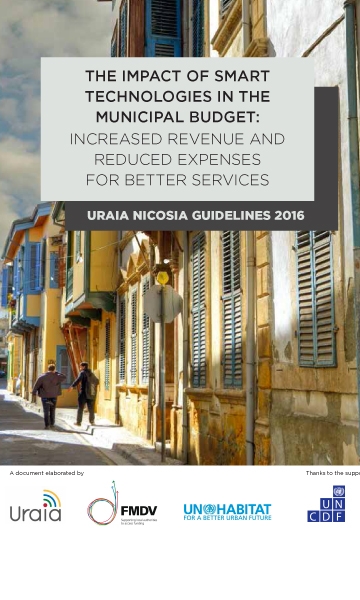The smart city is generally spoken of from the point of view of the practical benefits it brings to everyday life. According to a report by the Uraia organisation, the smart city is also beneficial for the budgets of municipalities involved in the digital transition. “The impact of smart technologies on the municipal budget” report analyses how.
Uraia, the
exchange portal between smart cities, launched by the Global fund for the development of cities (FMDV) of which the Brussels-Capital Region is a member, met in April 2016 for a workshop comprising representatives of local governments, city networks, service and technology suppliers, civil society, international organisations and research institutes from various countries. The goal of this workshop was to “discuss current trends regarding the use of smart technologies for greater efficiency in managing and identifying their potential impact on the municipal budget.”
Improving the management of municipal finances
The report stemming from this workshop, entitled
The impact of smart technologies on the municipal budget, consists of four chapters: digital government, transparency and community participation, energy efficiency of municipal property, efficiency of public services and infrastructure. It focuses on the benefits that local governments can derive from the smart city by increasing their revenue and reducing their costs.
Based in particular on concrete case studies as the basis for its analysis, the Uraia report concludes that the smart city will have a positive impact on public finances: “Smart technologies improve the management of municipal finances and thus strengthen cities’ capacity for investment”, Jean-François Habeau, Executive Director of FMDV stated.
4 smart levers of budgetary efficiency
Four technology layers contribute to the positive effects of the smart city on cities’ budgets:
- connectivity to route data to budgetary analysts and their applications;
- parameter measuring sensors (energy consumption, for example) used to collect and communicate these data in real time;
- the analysis of data via data mining software or predictive applications for example;
- automation in order to develop smart services and apps.
15 recommendations
Some 15 recommendations grouped into 3 themes are made as a conclusion to the report aimed at ensuring the success of a smart project.
Prepare
- 1 - Choose the technology and the projects that match the vision of the city
- 2 - Choose the technology according to the municipal capabilities
- 3 - Strengthen the institutional capabilities and invest in human resources
- 4 - Provide political leadership
- 5 - Start with pilot projects in small areas
- 6 - Lay down a clear and flexible regulatory framework
- 7 - Ensure the protection of data and cyber security
- 8 - Carry out the necessary studies
- 9 - Ensure the interoperability of systems and avoid isolated initiative
Collaborate
- 10 - Cooperate with the national government and the associations of cities
- 11 - Organise dialogue and coordination with several stakeholders
- 12 - Ensure integration between the city’s departments
Encourage use
- 13 - Carry out communication and ongoing awareness campaigns
- 14 - Establish incentives
- 15 - Combine traditional and technological solutions
